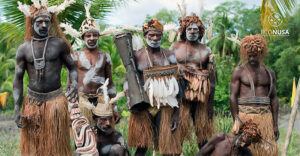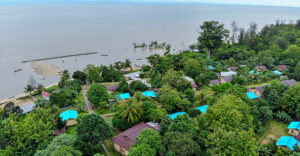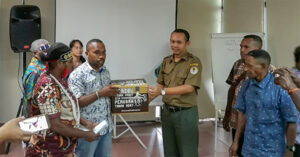
Covid-19 pandemic has led to remarkable impact to peoples in Indonesia. Economic slowdown has made workers losing jobs. In such a hardship, compassion should be well-maintained as a social capital. Lending a hand to each other serves as a ‘medicine’ to boost survival spirit amidst the pandemic.
Juliana Pattikawa, 75, also suffers from the Covid-19 pandemic impact in her family. Working as a tailor at Karang Panjang Village Sub-district, Sirimau District in Ambon Municipality, Juliana’s income drops drastically. Prior to pandemic, she could work on 12 pieces of shirts every month. But during the pandemic, the demand of her service declines. She only can sew two pieces of shirt in a month.
“People asking for sewing and repairing has dropped. I usually work on twelve shirts and even many more shirts on the church peak ceremonies in April and December. I can work on more than forty pieces of shirts,” said Juliana to EcoNusa.
Read also: EcoNusa COVID-19 Response Assistance in Maluku Island
The plummet of market demand has brought about serious financial problems to her family. Her income from sewing is allocated for financing the education of her three grandchildren and domestic needs. Worse, living cost in Ambon is deemed high. Even red onion may cost IDR80,000 per kilogram. Let alone, fish has no cheap price despite the living in the island areas.
On the other hand, the need for wearing mask as a way to prevent COVID-19 transmission has become the blessings to Juliana. She got various number of mask orders. Juliana, assisted by her two children, has ever worked out orders for thirty up to hundred pieces of mask.
Juliana made her pattern model of mask before sewing. Her two children cut the materials. One piece of mask costs IDR30,000 to IDR30,000. When she has extra products, Juliana shares them to her surrounding neighbors.
“I am grateful as I can help others by my own way. Lending a hand to each other makes me happy,” she said.
Similarly with Juliana, Hanna Corputty, 52, nurtures her adopted children to continue their education from her income as a tailor. Hanna has been a tailor since 1990 following the completion of her study at Pattimura University’s Faculty of Teacher’s Training and Education. Her main job is a teacher.
Read also: Vigilance at Yenbuba Village
As a teacher of State High School, SMAN 6 Ambon, Hanna felt sorry for some of her pupils dropping out of school due to their families’ economy constraints. She talked to the parents and asked their permission to support their children education. Those pupils were brought to her home. She kept doing such compassion even after she moved from SMAN 6 to State Vocational School, SMK Negeri 10, in Seram Bagian Barat.
“I bring up every child who comes from a low-income family with financial constraint. I set them free after graduation. Then I adopt other kids. There are ten children and all of them are girls,” said Hanna.
Hanna has currently fostered and brought up two children to survive their education. One of them is Belinda Watilete. Upon graduating from senior high school, she decided to stay with Hanna and continues her education to Pattimura University. Belinda is now on the seventh semester majoring in Bahasa Indonesia. She undergoes online lecturing during the Covid-19 pandemic. Another fostered girl, Helena Taniwel, study at State Vocational School, SMK Negeri 10.

Hanna Corputty)
Despite her sluggish income during pandemic and her hardship to support her adopted children financially, Hanna feels grateful to have much time to relax. Hanna used to work on two clothes a day. But now she only has order for sewing mask.
Read also: Bolstering Food Resilience to Fight Pandemic
“I am now not that strong (to work some orders). I should realize my limit as I am getting older and need more rests. Producing mask is easier than sewing cloth,” said Hanna.
Now, hundreds of masks produced by Hanna and Juliana have been used by the surrounding community in Maluku. Juliana and Hanna are among the other women working as a tailor who are in collaboration with EcoNusa Foundation to produce cloth-based masks. They jointly with other peer tailor ladies in Ambon and Seram produce 2,000 masks which were then distributed for free to peoples in some villages in Maluku.
In addition to mask production, EcoNusa also distributed medical support to local hospital and health facilities in some regions in Maluku. In North Maluku, the distribution of supports for Covid-19 prevention was done cooperatively with PakaTiva.
Editor: V. Arnila Wulandani dan Leo Wahyudi




